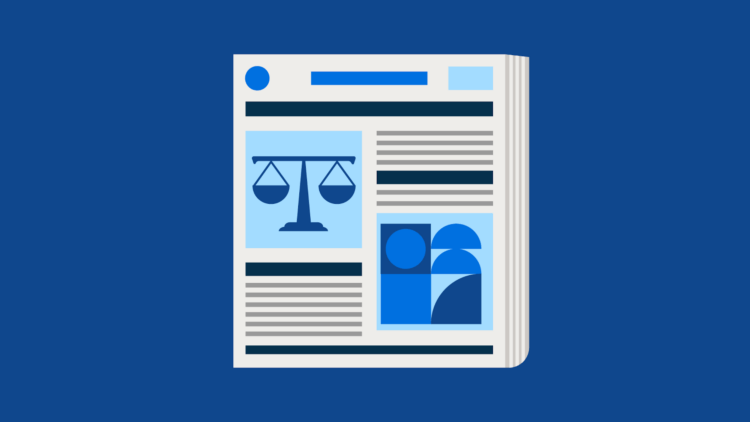With all the promise of modern-day payment processing for law firms, one issue continues to rear its ugly head—payment chargebacks. A chargeback occurs when a payment is returned to a cardholder’s debit or credit card due to a payment dispute. While accepting card payments from clients is a worthwhile practice for law firms, the looming threat of chargebacks remains.
Your firm must be prepared to handle chargebacks when they occur. Ideally, your law firm should also proactively take preventive measures to avoid chargebacks altogether.
In the following post, we outline what you need to know about chargebacks for law firms. This includes understanding why a legal client might request a chargeback in the first place. You also need to understand the chargeback process, including how your law firm can respond and dispute the chargeback. And, for legal practices using Clio Manage for billing and payment management, we explain how Clio Payments is a built-in option that works with your firm to handle the chargeback process.
What is a chargeback?
A chargeback is a debit or credit card payment that is reversed by the cardholder’s bank when the cardholder disputes the charge. The bank “charges back” the amount of the disputed payment to the merchant or service provider.
In the context of payments for legal services, chargebacks lead to the money being returned to the cardholder without the law firm’s approval. The firm then has a limited amount of time to challenge the payment dispute and fight the chargeback.
Are chargebacks illegal?
While they may be frustrating to deal with, chargebacks are not illegal when customers feel they have a legitimate dispute. However, chargeback fraud—such as when a customer intentionally abuses the chargeback process or knowingly falsely reports a legitimate transaction for a chargeback—is a type of fraud.
Why might a legal client request a chargeback?
For merchants and non-legal service providers, customers may file chargeback requests for several reasons, such as:
- The customer may not recognize the transaction and suspects it is fraudulent.
- The customer may not be satisfied with the services provided.
- The customer may simply be making a bad-faith effort to obtain goods or services free of charge.
As for legal clients, their typical reasons for chargeback requests are similar. These may include:
- Unfamiliar charges. It is possible for cardholders to simply not recognize your firm’s charge, which is an easily resolved dispute.
- Dissatisfaction with services. Clients may be dissatisfied with the legal services they received or the amount charged. Areas where this issue often arises include prepaid consultations or flat fees that are paid upfront.
- Fraudulent transactions. If someone makes a payment to your law firm using stolen credit card information, the legitimate cardholder will likely report the transaction for a chargeback. There may be some overlap in unfamiliar and fraudulent reasons for chargebacks, as the card holder may claim a fraudulent transaction because they don’t recognize it.
You may like these posts
What happens when a chargeback is requested

Broadly speaking, the chargeback process for law firms has two main phases—the client’s initiation of the chargeback and the firm’s opportunity to challenge the payment reversal.
1. Client initiation of the chargeback
The chargeback process begins when a legal client disputes the validity of a payment they made using an accepted credit or debit card. For law firms using Clio Payments to accept payment for services, these accepted cards include Visa, Mastercard, American Express, Discover, JCB, and UnionPay among others. Whereas accepted debit cards include Discover, Visa and Mastercard.
The chargeback initiation results in the funds being returned to the cardholder immediately, as well as an additional chargeback fee. The burden is then put on the law firm to prove the payment was legitimate and valid.
The issuing bank will assign a reason code to the chargeback, based on the client’s reason for disputing the charge. Each of the major card carriers has a different set of standardized reason codes. For example, the American Express reason code AO1 signifies “Charge Amount Exceeds Authorization Amount.” Each reason code comes with different types of required evidence and standards of proof and therefore each chargeback case should be treated differently.
When it comes to clients initiating chargebacks with their law firms, It’s important to remember that chargeback rulings are determined by the card networks and Clio is obligated to follow their rules. With the standard procedure of all chargebacks, only the cardholder who has made a payment can initiate a chargeback—Clio has no control over when a cardholder decides to do this.
2. Challenging the client’s chargeback
Once a cardholder initiates a chargeback, a law firm may either accept the chargeback or fight it through the process of representment. In fighting the chargeback, the following occurs:
- Evidence gathering. The firm gathers all appropriate documentation that helps prove the chargeback dispute reason as false.
- Evidence submission. The firm submits evidence to the “issuing bank” (AKA the bank that issued the credit card) that the transaction was valid and the chargeback claim should be overturned.
- Review. The issuing bank reviews the evidence and issues a ruling.
- Result. If the decision rules in favor of the law firm, the funds will be returned.
Accordingly, the law firm needs to submit the strongest evidence possible in order to prevail. The time limit for the firm to respond to the chargeback varies depending on the card network and the reason code.
Firms that are Clio Manage customers, will receive a message indicating that a chargeback has occurred and when it happened, asking them to contact Clio’s Payment Operations team with any questions.
How to prevent chargebacks
Preventing chargebacks saves your firm time and money, while also delivering a better experience to clients. While it’s nearly impossible to eliminate chargebacks entirely, law firms can use certain strategies to help avoid them.
Ensure clear and frequent communication
A key way to stop chargebacks before they happen is to actively ensure excellent communication with clients. Prioritizing clear and frequent communication in the following areas can make a big difference in reducing your firm’s chances of chargebacks:
- Set straightforward expectations. By communicating exactly what clients are being billed for, and how they will be billed, you can help prevent misunderstanding and potential chargebacks. This could mean steps like providing a scope of work for flat fee services and having clear fee agreements.
- Make sure your firm’s statement descriptor matches your business name. If a client sees an unrecognizable name pop up on their credit card statement, they may think that they’ve been mischarged or are the victim of fraud. Make sure that your statement descriptor (AKA the merchant name that shows up on your client’s credit card statement) is recognizable and matches your firm.
Note: if you use Clio Payments, you can customize your statement descriptor in Clio.
- Ensure clients can easily contact your firm if they need to. If your client has a question or concern about a charge, it’s important to make it simple for them to reach out to your firm for resolution—without having to request a chargeback.
Make sure your firm’s payment policies are easy to find (for example, you can create an FAQ page with details on your website) and that it’s convenient for clients to get in touch with your firm directly (making your law firm contact details readily available online can help).
- Create a clear, low-hassle refund process. Your firm’s refund and payment dispute policies should be easy to understand, accessible, and communicated in writing. And, if a client contacts you about a legitimate error for which they’re entitled to a refund according to your policies, take care of it promptly. Don’t make clients chase you for legitimate refunds, as this could lead to uncertainty and potential chargebacks.
Did you know that Clio offers split billing functionality, allowing for multiple payers on the same bill? Check out how we can change the way your firm bills clients.
Hold on to proof of work documentation
Having evidence that a chargeback request is not legitimate—such as payment authorization documentation or email communication from the client regarding payment—makes it much easier to dispute an erroneous chargeback. You may also consider asking clients to complete a payment authorization form, and keep those written records.
It is also advisable for your firm’s terms and conditions of service to include verbiage about how there can never be a guarantee in results, and your policy for cancellation of services should be clearly stated.
Additionally, authorization forms for transactions should be completed on a per-transaction basis. These need to be signed by the cardholder—who is not always the client.
Finally, it is helpful to obtain documentation signed by the client confirming the completion of services once the client’s case is closed.
Deliver a great client experience
Dealing with legal issues and paying for legal services is inherently stressful, but law firms that purposefully strive to deliver an excellent experience will generally have happier clients. Clients who have had an overall positive experience working with your firm are more likely to reach out directly if there’s a payment issue rather than issuing a chargeback.
The chargeback process at Clio

Chargebacks are a breeze when you’re a Clio Manage customer. The payment operations team at Clio will help your law firm every step of the way, from supporting you with disputing the chargeback, to helping you respond in a timely manner, and submitting all the best evidence.
Differences from eCheck returns
Another key point is that a chargeback is not the same as an eCheck return. Electronic checks (eChecks) are electronic transfers of funds between bank accounts and another form of payment facilitated by Clio Payments.
Unlike chargebacks, eCheck returns do not involve a merchant dispute resolution process. Instead, the funds are simply returned to the client. eCheck returns are generally done with transactions that are not authorized or have incomplete information. Since eCheck reversals cannot be challenged by the firm, the firm will have to directly contact the client to resolve the issue.
This should be an important consideration for law firms when requesting eCheck payments as the preferred method of payment. Unlike credit cards, eCheck (ACH) payments offer no merchant dispute resolution process that can be mediated by the bank or card network. Therefore, more risk is implied.
Final notes on chargebacks
Chargebacks may be a hassle, but they’re a solvable challenge and should not dissuade your firm from accepting online payments. Taking proactive steps to improve client communication and set up clear payment policies goes a long way towards reducing the chances of clients charging back transactions—but you can’t eliminate chargebacks entirely.
Law firms can be prepared for client chargebacks by knowing how to effectively react. If your firm is a Clio Manage customer, Clio will help you respond to the dispute and provide the best evidence possible.
Learn how to activate the payments feature in Clio Manage, here, and discover how Clio can help you handle chargeback disputes, set up payment schedules, split bills, and more! Billing clients has never been so efficient.
What is a payment chargeback?
A payment chargeback occurs when a debit or credit card payment is reversed by the cardholder’s bank because the cardholder disputes the charge. The bank “charges back” the disputed payment amount to the merchant or service provider.
What is the chargeback process?
Broadly, the typical chargeback process begins when a customer contacts their bank or card issuer to dispute a transaction. If the bank or card issuer determines that the dispute is valid, it then initiates a chargeback by withdrawing the disputed amount (as well as, often, a chargeback fee) from the merchant’s account. The merchant is notified by their bank of the chargeback, and then has a limited amount of time to dispute a chargeback through the process of representment. If the customer’s bank or card issuer decides in favor of the merchant after reviewing evidence, then the funds will be returned to the merchant; if the merchant accepts the chargeback or if the bank does not agree with their evidence of the transaction’s validity, then the funds will remain with the customer.
We published this blog post in May 2022. Last updated: .
Categorized in: Technology









